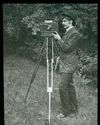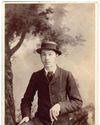If you think the landscapes of Carl Warner look good enough to eat, then you’re not far from the truth. Oliver Atwell tours an edible wonderland.

There are many times in our lives when we look at an innocuous object and, often to our amusement, we see something else. How many times have you looked at the front of a car and seen the bumper, grille and headlights arrange themselves into a smiling face? How many times have you looked to the sky and seen clouds morph into recognisable objects right in front of your eyes? It’s a very common thing for people to do. We’re hardwired to find patterns in disorder.
However, one man has made a career out of creating images that utilise this very idea. In the mind of Carl Warner, a simple cauliflower can become a frosted forest tree and a delicious box of chocolate fingers can become railway sleepers.
Looking through Carl’s work, it’s difficult not to be struck by the wealth of imagination on display. Every landscape is painstakingly conceived and executed. While he uses other materials as well, it’s his foods capes that have garnered Carl global attention. His work has been seen all over the world, on a variety of TV shows and in a host of publications. Food, like numbers, is something of a universal language.
Carl is someone who has always loved the ‘visual’. As a child growing up in Kent, he would spend hours sketching in his room and absorbing the works of Salvador Dali, Patrick Woodroffe and the record-sleeve artist Roger Dean. Art college followed and soon Carl began to realise that his talents were better served by photography. Later, he began to explore both landscape photography and still-life imagery – two disciplines that, as you can see, have married beautifully in the work we see now.
The right ingredients
Diese Geschichte stammt aus der February 18,2017-Ausgabe von Amateur Photographer.
Starten Sie Ihre 7-tägige kostenlose Testversion von Magzter GOLD, um auf Tausende kuratierte Premium-Storys sowie über 8.000 Zeitschriften und Zeitungen zuzugreifen.
Bereits Abonnent ? Anmelden
Diese Geschichte stammt aus der February 18,2017-Ausgabe von Amateur Photographer.
Starten Sie Ihre 7-tägige kostenlose Testversion von Magzter GOLD, um auf Tausende kuratierte Premium-Storys sowie über 8.000 Zeitschriften und Zeitungen zuzugreifen.
Bereits Abonnent? Anmelden

Calling The Shots: A Queer History of Photography
Offering an unprecedented view of photographic history through a queer lens, this is a wonderful and powerful book, says

Large-aperture standard zoom, too
SONY has also revealed a new premium standard zoom, the FE 28-70mm F2 GM.

Super-fast, high-res Sony Alpha Ai II
SONY has announced its new professional full-frame flagship camera, the Alpha A1 II.

39 awesome accessories
Our round-up of the best accessories we've used and reviewed this year, along with some old favourites. There's something here for every budget, starting from just £7, including tripods, bags, filters and much more

Such a thing as society
This autumn sees the launch of a major new book and exhibition devoted to examining the multiplicities of photography during 1980s Britain. Peter Dench finds out more

Join Club
The sociable Canvey Island Photographic Club is keen to grow its in-person meet ups

Capturing flight
Winners and finalists of Bird Photographer of the Year share their tips for success with Hollie Latham Hucker

140 years of change
AP has become the world’s oldest surviving consumer photo magazine because we have moved with the times, says Nigel Atherton

Preserving history in platinum
A deep dive into the meticulous art of platinum printing, and the collaboration between the Royal Geographical Society and Salto Ulbeek. Mike Crawford explores how they brought historical photographs to life with enduring beauty and precision

Life in the past lane
What was life like for an amateur photographer in 1884? John Wade takes a trip back in time